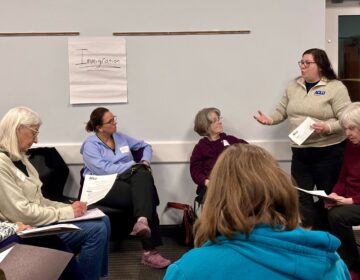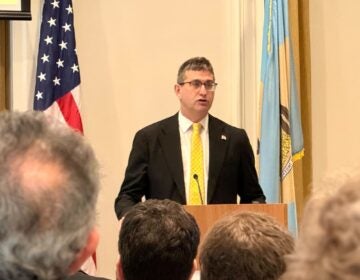Fees and fines would be waived for indigent Delaware defendants in bill released from state House committee
The Office of the Controller General estimated that 40% of collections may qualify for the waiver if a defendant meets the eligibility requirements and is granted relief.
Listen 0:56
Legislative Hall in Dover, Delaware (Emma Lee/WHYY)
From Philly and the Pa. suburbs to South Jersey and Delaware, what would you like WHYY News to cover? Let us know!
Delaware resident Rebecka Ash said after serving her sentence for a drug charge, the hardest part wasn’t staying sober or avoiding committing another crime. It was the never-ending cycle of having to pay her court ordered fines and fees, or face being reincarcerated.
“Multiple times I had to choose [between] paying $20 to avoid being arrested, buying medication or simply keeping my lights on,” Ash testified before a state House committee this week. “The impact wasn’t just on me. My husband, a 20-year military veteran, had to file for bankruptcy to save our home after I lost my income due to rearrest over unpaid fines. I was doing everything right, working, going to school, staying in recovery, but the system only cared whether I paid on time, every time.”
Legislation sponsored by state Rep. Claire Synder-Hall, D-Rehoboth Beach, would allow Delaware courts to waive certain fees and fines for defendants without the ability to pay.
The bill would give courts the ability to remove part or all of certain court-ordered financial penalties if it decides the defendant qualifies for a hardship waiver. Under the measure, the court would be more likely to assume a defendant had a hardship if they submitted evidence they were on government assistance programs such as Medicaid, subsidized public housing, food stamps, cash assistance or Social Security Disability Insurance. It also creates a hearing process.
Concerns due to potential fiscal impact
The bill received considerable opposition during the House committee hearing, including some questions over its financial impact.
Money assessed for crimes can go into the state’s general fund or into specially-created funds such as a court security fee, victim’s rights fee, Transportation Trust Fund fee, Voluntary Ambulance Fund fee and a videophone fee. Synder-Hall said she plans to introduce an amendment to make sure the Victim Compensation Fund was not impacted.
The fiscal note filed with the bill said the cost was “indeterminate.”
The Controller General’s Office found it could not determine the bill’s official financial impact. The courts collected $4.5 million in criminal fines and $10.9 million in criminal fees, costs and assessments in fiscal year 2024.
The Office of the Controller General estimated that 40% of collections may qualify for the hardship waiver if a defendant meets the eligibility requirements and is granted relief, which would reduce revenue by about $6 million.
The remaining 60% of collections originate from the Voluntary Assessment Center, which is excluded from this legislation and deals with traffic violations.
Delaware State Police’s Legislative Liaison Sgt. Mike Ripple asked the committee to table the bill until a more specific fiscal note was added.
According to the Criminal Legal System Imposed Debt Study Group’s 2023 report, more than $40 million has been written off as uncollectible since 2021. Restitution, which is financial compensation paid to victims, was only written off if the defendant was found to be dead. The report also shows that over a 10-year period, 33% of Court of Common Pleas and 41% of Superior Court cases never saw a payment.
Synder-Hall says being convicted of low-level offenses shouldn’t destroy someone’s life.
“For people with means, they don’t,” she said. “But those with fewer resources, the fees associated with even minor violations can turn a small mistake into a life sentence of debt and poverty.”
Some committee members said they were concerned about the possible loss of funding for programs.
State Rep. Bill Carson, D-Smyrna, said fire companies and ambulances depend on a fee mandated by the courts that’s paid by toll and traffic light camera violators. He said they knew when it was added that some defendants wouldn’t be able to pay the fee.
“With the money we were going to get, even with the loss of some revenue, it would be a huge, huge boost to the endless service,” he said. “And it’s worked very well.”
Those entities also receive money through the Grant-in-Aid legislation.
State Rep. Bryan Shupe, R-Milford, said replacement revenue would need to be found for programs dealing with youth rehabilitation, probation, drug testing and reentry services. Rep. Snyder-Hall said she would work with him on a bill so the general fund could pick up the future cost of these services.
The legislation now heads to the House floor.
This story was supported by a statehouse coverage grant from the Corporation for Public Broadcasting.

Get daily updates from WHYY News!
WHYY is your source for fact-based, in-depth journalism and information. As a nonprofit organization, we rely on financial support from readers like you. Please give today.







